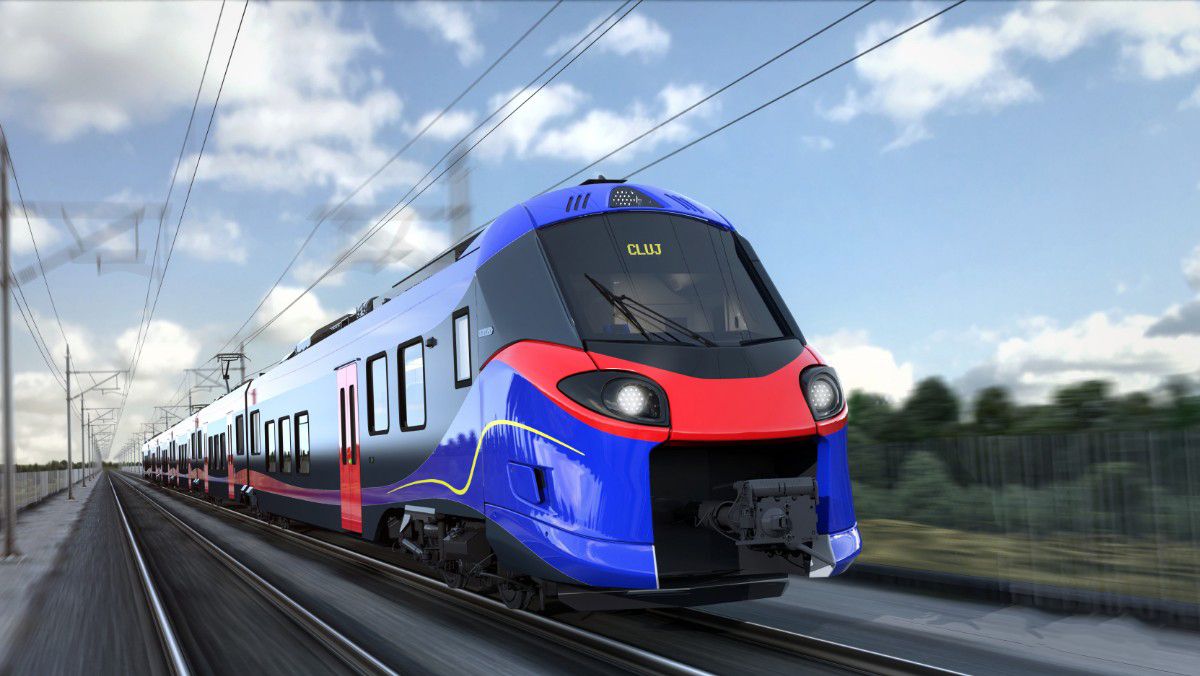 The European Commission has provided more than EUR 52 million through the Cohesion Fund to support Romanian train procurement project comprising 37 electric multiple units for interregional rail routes.
The European Commission has provided more than EUR 52 million through the Cohesion Fund to support Romanian train procurement project comprising 37 electric multiple units for interregional rail routes.
“The new multiple unit trains will have a positive impact throughout the entire railway network in Romania. Increasing the frequency and comfort of the rides and incentivising the use of trains is important for territorial and social cohesion, facilitating access to jobs and public services to all. It improves the sustainability of transport, thus contributing to the green transition,” Commissioner for Cohesion and Reforms, Elisa Ferreira, said.
In March 2022, the Romanian Railway Reform Authority (ARF) and Alstom signed a EUR 263 million (RON 1.3 billion) contract for the supply of 37 electric trains of which 20 inter-regional passenger trains and 17 Coradia Stream EMUs. Alstom will also be responsible for the maintenance of the trains for a period of 15 years. Of the total value of the contract, EUR 188.7 million is the value of the new trains while EUR 76.6 million represents the value of the maintenance service agreement.
In addition, the contract also included an option for 17 Coradia Stream inter-regional EMUs, exercised by ARF in September 2022 which includes the provision of maintenance services for 30 years.
The entire value of the contract signed between Alstom and the Romanian Railway Reform Authority reaches EUR 748 million.
Romanian train procurement project will increase transport capacity and significantly improve the quality of railway services on the main interregional electrified rail corridors linking Bucharest to regional hubs such as Arad, Cluj-Napoca, Constanța, Brașov, Timișoara, Iași, Galați, Craiova, Petroșani and Suceava.
The train fleet will be equipped with ERTMS Level 2 and comply with both European standards and the TSIs, being capable of operating on all the main European power supply systems. The maximum speed of the trains will be 160 km/h.
The six-car electric trains will have a capacity of 350 seats and will provide large-size luggage racks. They will be 100% low floor to increase the accessibility for passengers with reduced mobility.
The EMUs will be equipped with air conditioning system and passenger information system.
The delivery is expected to begin at the end of 2024.
In addition, ARF announced on august 28, 2023, that the association of Egis Romania (leader) – Egis Rail is the selected company for the provision of supervising services for the train contract. RON 2.48 million (EUR 494,909) is the value of the contract under which the association will issue the provisions related to the performance of the contract (between ARF and Alstom) according to the assumed obligations, will check the fulfillment of the delivery schedule, will participate at the train testing and reception procedures and will verify the invoices issued by the supplier related to the train delivery invoices and the compliance with the provisions of the contract.
Under the plans, the Romanian train procurement also includes hydrogen trains. In March, ARF published on the national public procurement platform a procedure to prepare the acquisition of hydrogen trains for regional and interregional multiple units.
According to the procedure, there are three variants of interregional trains relating to the capacity with 160, 180 and 200 of fixed or folding seats for passengers as well as 16 bicycle racks.
For the hydrogen trains to operate on regional lines, the authority mentioned two variants which include 120 and 160 fixed and folding seats for passengers, as well as 16 bicycle racks.
The ARF evaluation committee announced on July 31, 2023, for the procurement of 12 hydrogen trains the association of Alstom (leader) – Linde Gaz Romania (associate) has submitted the documentation.
The value of the procurement is between RON 2.4 billion (EUR 487.4 million) and RON 4.1 billion (EUR 830.5 million) excluding VAT and the duration of maintenance services is estimated at 15 and 30 years respectively. The duration of the contract will be 213 months (almost 18 years).
The 12 hydrogen fuel cell trains will be used to be operated under public service contracts on the non-electrified routes such as Bucharest – Pitești with a possible extension to Piatra Olt – Craiova line, as well as on the Bucharest – Henri Coandă Airport, Bucharest – Târgoviște and Bucharest – Pitești – Curtea de Argeș lines. The public service contracts will be awarded to operators according to the Regulation 1370/2007/EC, as amended and according to Romanian legislation.
Share on:



